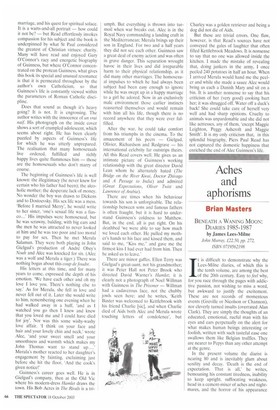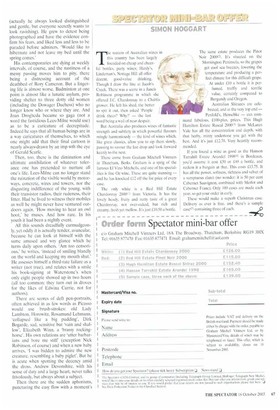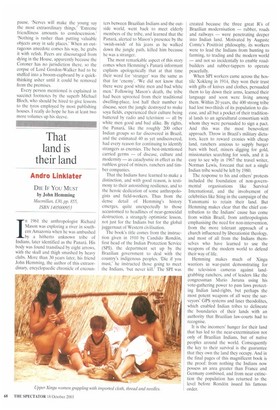Aches and aphorisms
Brian Masters
BENEATH A WANING MOON: DIARIES 1985-1987 by James Lees-Milne John Murray, .02.50, pp. 272, ISBN 0719562198 It is difficult to demonstrate why the Lees-Milne diaries, of which this is the tenth volume, are among the best of the 20th century. Easy to feel why, for you race through the pages with addictive passion, not wishing to miss a word, but awkward to justify the excitement. These are not records of momentous events (Greville or Nicolson or Channon), nor cleverly turned insults (overrated Alan Clark). They are simply the thoughts of an educated, emotional, rueful man with his eyes and ears perpetually on the alert for what makes human beings interesting or foolish, written with such tasteful ease one swallows them like Belgian truffles. They are nearer to Pepys than any other attempt at the genre.
In the present volume the diarist is nearing 80 and is inevitably glum about senility and decay. 'Death is the end of expectation. That is all,' he writes, bemoaning his constant tiredness, inability to keep upright, suffocating weakness, head in a cement-mixer of aches and nightmares, and the horror of his appearance (actually he always looked distinguished and gentle, but everyone secretly wants to look ravishing). He grew to detest being photographed and have the evidence confirm his fears, and liked less and less to be paraded before admirers. 'Would like to hibernate and not leave my bed until the spring comes.'
His contemporaries are dying at weekly intervals, of course, and the nastiness of a messy passing moves him to pity, there being a distressing account of the deathbed of Rory Cameron. But a lingering life is almost worse. Badminton at one point is almost like a lunatic asylum, providing shelter to three dotty old women (including the Dowager Duchess) who no longer know who or where they are. And Joan Drogheda became so gaga (not a word the fastidious Lees-Milne would use) as to be a caricature of decrepitude. Indeed he says that all human beings are in a way caricatures of themselves, to which one might add that their final cartoon is nearly always•drawn by an imp wth the eye of Gerald Scarfe.
Then, too, there is the diminution and ultimate annihilation of whatever tolerance one has pretended to nurture all one's life. Lees-Milne can no longer stand the ruination of the visible world by motorways, concrete, wires and towers, nor the disgusting indifference of the young, with their transistor radios, their rudeness, their litter. Had he lived to witness their mobiles as well he might never have ventured outdoors again. 'How moving to hear an owl hoot,' he muses. And how rare. In his youth it had been a nightly event.
All this sounds dreadfully curmudgeonly, yet oddly it is actually tender, avuncular, because he can look at himself with the same amused and wry glance which he turns daily upon others. 'Am too censorious,' he writes, 'instead of smiling blandly on the world and keeping my mouth shut.' He assesses himself a third-rate failure as a writer (not true), and relates with a smile his book-signing at Waterstone's when only eight people showed up in two hours (all too common; they turn out in droves for the likes of Edwina Currie, not for authors).
There are scores of deft pen-portraits, often achieved in as few words as Picasso would use brush-strokes: old Lady Lambton. Horowitz, Rosamund Lehmann, 'collapsed like a big pudding', Dirk Bogarde, sad, sensitive but 'vain and shallow', Elizabeth Winn, a 'brassy rockinghorse'. His own relations are 'utter barbarians and bore me stiff' (exception Nick Robinson, of course) and when a new baby arrives, 'I was bidden to admire the new creature, resembling a baby piglet'. But he is acute when spotting the decency amid the dross. Andrew Devonshire, with his sense of duty and a large heart, never talks frivolously, hut always about a subject.
Then there are the sudden aphorisms, puncturing the easy flow with a moment's pause. 'Nerves will make the young say the most extraordinary things.' Extreme friendliness amounts to condescension.' 'Nothing is rasher than putting valuable objects away in safe places.' When an outrageous anecdote comes his way, he grabs it with relish. Peers are discouraged from dying in the House, apparently because the Coroner has no jurisdiction there, so the corpse of Lord Gordon-Walker had to be stuffed into a broom-cupboard by a quickthinking usher until it could be removed from the premises.
Every person mentioned is explained in succinct footnotes by the superb Michael Bloch, who should be hired to give lessons to the tyros employed by most publishing houses. I really do hope he has at least two more volumes up his sleeve.




































































































 Previous page
Previous page